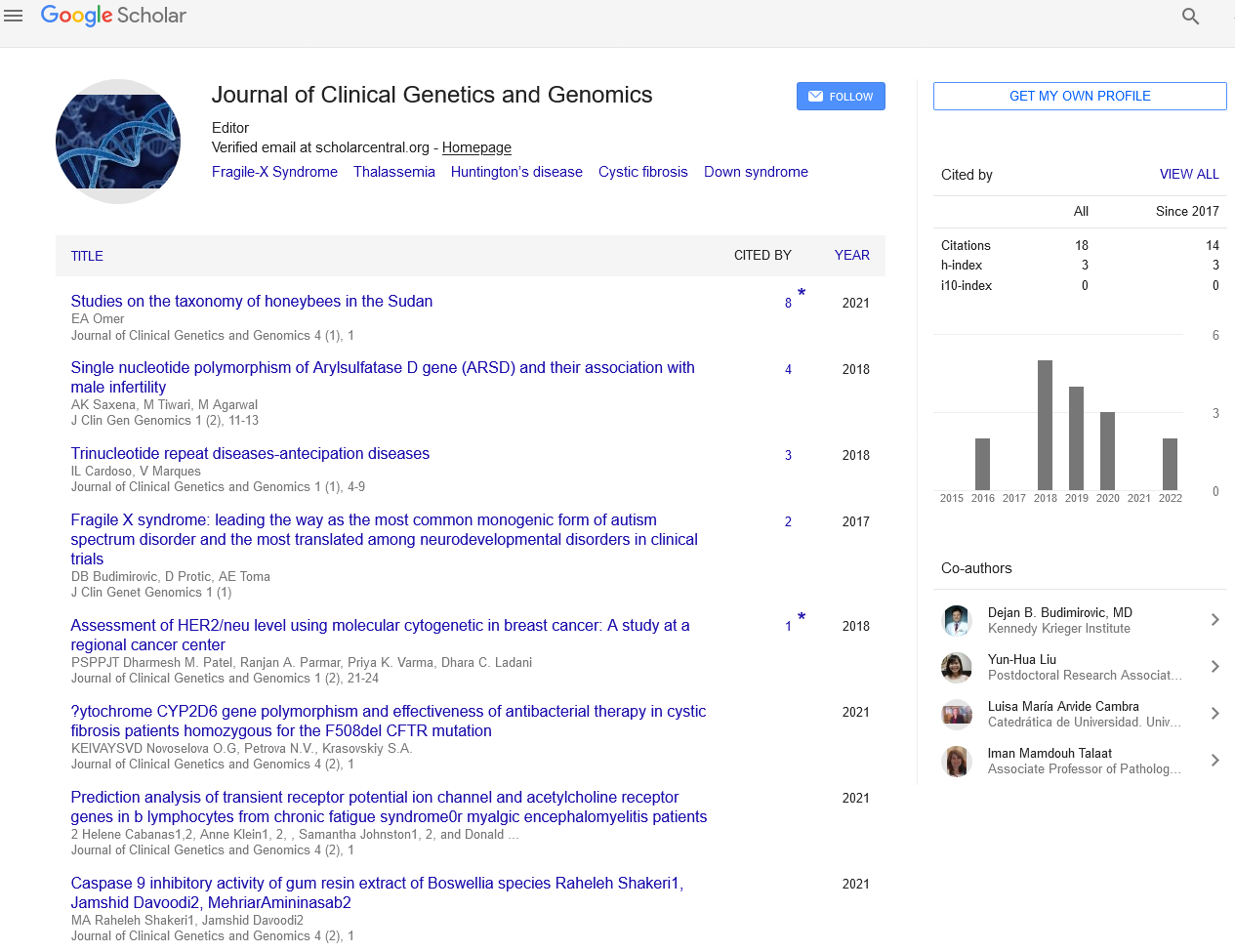The Aging of the Hematopoietic System Is Influenced by TNFAIP3
Received: 06-Jun-2022, Manuscript No. PULJCGG-22-5972; Editor assigned: 08-Jun-2022, Pre QC No. PULJCGG-22-5972 (PQ); Accepted Date: Jun 17, 2022; Reviewed: 12-Jun-2022 QC No. PULJCGG-22-5972 (Q); Revised: 15-Jun-2022, Manuscript No. PULJCGG-22-5972 (R); Published: 20-Jun-2022, DOI: 10.37532/puljcgg.22.5(3) 1-2
Citation: Betjeman J . The aging of the hematopoietic system is influenced by TNFAIP3. J. Clin. Genet. Genom. 2022;5(3):1-2.
This open-access article is distributed under the terms of the Creative Commons Attribution Non-Commercial License (CC BY-NC) (http://creativecommons.org/licenses/by-nc/4.0/), which permits reuse, distribution and reproduction of the article, provided that the original work is properly cited and the reuse is restricted to noncommercial purposes. For commercial reuse, contact reprints@pulsus.com
Abstract
Chronic inflammation or ageing result in a functional reduction in Hematopoietic Stem And Progenitor Cells (HSPC). Numerous autoimmune, inflammatory, and hematologic cancers are linked to haploinsufficiency of A20, or TNFAIP3, an innate immune regulator. We found that the expression of A20 is much lower in elderly HSPC as compared to youthful HSPC, which is based on a prior analysis of the epigenomic and transcriptome changes that occur throughout normal human ageing. Here, we demonstrate how the partial reduction of A20 expression in young HSPC leads to aging-related characteristics. Particularly, myeloid-biased hematopoiesis, lower HSPC fitness, and enlargement of the HSPC pool were all effects of heterozygous deletion of A20 in hematopoietic cells. These findings imply that altered A20 expression in HSPC contributes to an aging-like phenotype and that inflammatory conditions and ageing may share an underlying mechanism for reduced HSPC function.
Key Words
Hematologic; Myeloid-biased; Heterozygous; Inflammatory; Autoimmune
Introduction
Hematopoietic Stem Cells (HSCs) generate and sustain blood lineages that are in charge of immunity and tissue homeostasis. Self-renewal and multilineage differentiation, or the ability to differentiate into all blood cell types, are two features that make HSC crucial to hematopoiesis. Hematopoietic progenitor cells produce daily blood in the steady state when HSC are dormant. Inflammatory signals trigger acute HSC proliferation in response to damage or infection to reestablish homeostasis. Negative effects on HSC selfrenewal and potency are caused by autoimmune illness, inability to treat inflammation, or persistent inflammation. These conditions are frequently accompanied by myeloid-biased differentiation. The functional decline of HSC is similar to what happens as people age. Hematologic malignancies, chronic inflammation, and ageing hematopoiesis actually share a lot of characteristics. Genome sequencing of human hematologic malignancies has identified somatic mutations in genes involved in inflammatory signalling, which has been linked to leukemogenesis.
Hematopoiesis and HSC function depend on A20, also known as TNFAIP3, an anti-inflammatory signalling protein that limits a number of intracellular signalling cascades. A20 has zinc finger domains that provide E3 ligase activity and an OTU domain that serves as a deubiquitinating protease . A20's dual ubiquitin-editing functions negatively regulate excessive NF-B signalling in response to a number of immune pathways, such as Tumor Necrosis Factor Receptor, Interleukin-1 Receptor, and Toll-Like Receptor signalling, by altering the ubiquitin chains on important intermediates RIP1 and TRAF6.
A20 is only weakly expressed in healthy cells, but it is abruptly induced by the stimulation of Pathogen-Associated Molecular Patterns (PAMPs) and pro-inflammatory cytokines in an NF-Bdependent manner. Germline single nucleotide polymorphisms in TNFAIP3 have been linked to autoimmune and inflammatory illnesses such as systemic lupus erythematosus, rheumatoid arthritis, and Crohn's disease in human genetic investigations. Furthermore, one-third of individuals with B-cell lymphomas had biallelic inactivation of A20, suggesting that this gene may serve as a tumour suppressor. A20 plays a role in avoiding inflammatory and autoimmune illnesses, as shown by the premature death from systemic inflammation in A20-deficient animals, which is consistent with these clinical data.
HSCs become more prevalent as people age, go through myeloidbiased lineage priming and differentiation, and show a functional reduction in their capacity for regeneration. Recent research has documented the epigenomic and transcriptional alterations that occur in human HSCs throughout healthy ageing. When compared to HSC from young people, phenotypically defined HSCs (Lineage-CD34+CD38-) from older people showed epigenetic reprogramming, including redistribution of DNA methylation and reduction in H3K27ac, H3K4me1, and H3K4me3 near regulatory regions of some genes.
We discovered that A20 expression was dramatically decreased in old HSCs by around 40% as compared to young HSCs in humans and mice, despite the fact that numerous genes, enhancers, and promoters are significantly impacted in young and aged HSCs. We hypothesised that partially reduced expression of A20 may have an influence on hematopoiesis and HSCs consistent with accelerated ageing because abnormalities in A20 are linked to the aetiology of autoimmune diseases, aberrant hematopoiesis, and hematologic malignancies. Only a few studies have looked at the loss of A20 in the hematopoietic system, despite the fact that earlier studies have created conditionally targeted A20 deleted animals to explore lineage-specific and tissue-specific deletions of A20. Myeloid proliferation, B cell apoptosis, and anaemia were seen in conditional A20 deletion animals, along with an excess of pro-inflammatory cytokines.
A20 has also been specifically linked to HSC function. The total loss of A20 in HSCs is incompatible with hematopoiesis, as demonstrated by deletion of A20 in hematopoietic cells utilising conditional and inducible animal models. These research focused on the total loss of A20 to highlight the significance of A20 on normal hematopoiesis and offer significant new insights into the role of A20 as a crucial regulator of immune cell function and hematopoiesis. The effects of partial A20 expression reduction, which is observed in autoimmune and inflammatory illnesses as well as aged HSCs, are still unknown. The hematopoietic system's conditional heterozygous deletion of A20 was investigated in this study. We report that the expansion of an HSC-enriched pool is caused by partial deletion of A20.





